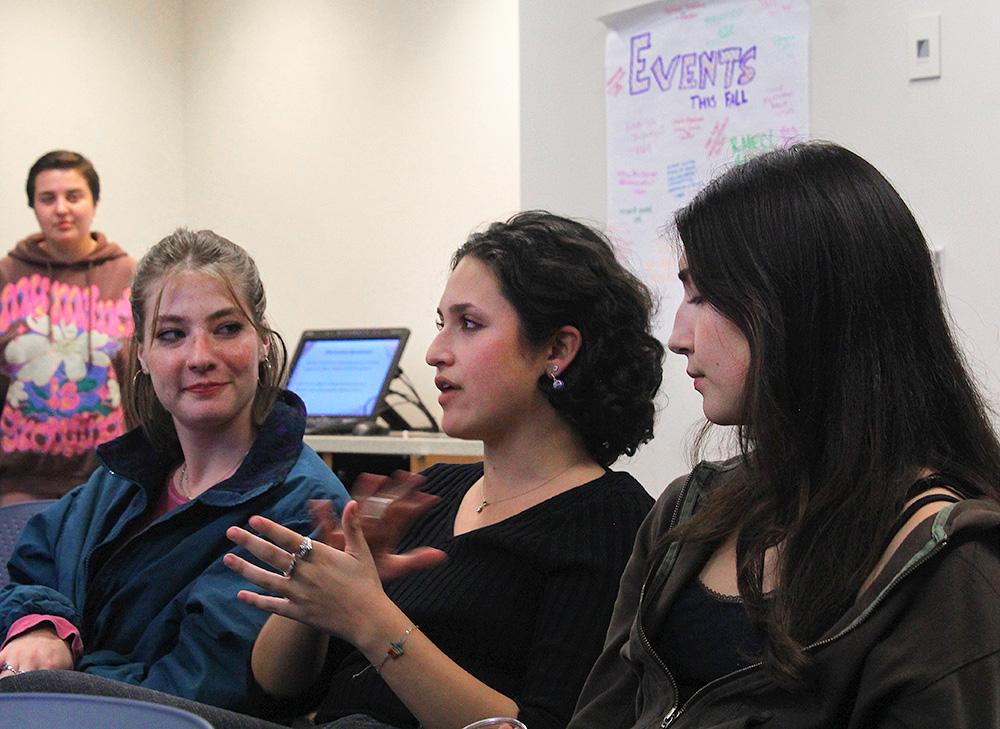
Through mediums like textile, oil paint and watercolor, students explored their experiences with Pride and the LGBTQ+ community on Tuesday night. The virtual queer exhibition hosted by the Boston University Center for Gender, Sexuality and Activism with the Queer Activist Collective commemorated National Coming Out Day on Oct. 11.
The event also included a presentation and discussion with Heather Barrett, a senior lecturer and associate director for the College of Arts and Sciences Writing Center, who has been “out for half of her life.”
“Visibility is really important among the queer community,” Barrett said. “If the goal was to sort of live in a world where people can live as openly or as un-openly as they choose to, people who are out and visible can help to facilitate that and make that possible.”
Barrett discussed in her presentation “Coming out of the past: What can historical queer literature teach us about gender + sexuality today?” the importance of historical queer art highlighted by authors such as Emily Dickinson, Mary Eleanor Wilkins Freeman and Julia Ward Howe.
“It’s so important to have a sense that we have a past, and that’s true for any marginalized community,” Barrett said. “So often, the way that history and literature has been taught has been to create this sense that only very specific groups of people, namely, straight white people, have a past.”
Although being visible is important for younger generations to see, Barrett said, not coming out doesn’t in any way invalidate identifying as queer.
“Coming out is such a strange thing because in some ways, you shouldn’t have to come out or that shouldn’t be the only way to necessarily express your identity,” Barrett said.
Uma Ashrani, a sophomore in CAS and the co-event coordinator for CGSA, said there are a “lot of difficult feelings” associated with coming out and people “don’t have the words for it.”
“Art lets you express a lot of feelings that you couldn’t express with just a label or just a conversation,” Ashrani said.
A lot of the submissions they received, she said, represented how artists felt a lot more acceptance years after coming out.
“Coming out is always treated as this one-time event, sometimes it goes well, other times it doesn’t,” Ashrani said. “Nobody really talks about the aftermath of that and how just freeing it can feel after you come out, and then you’re just part of this community and you’re relieved that you can just be yourself.”
Ashrani said having this “designated space” helps celebrate and support the queer community.
“So many conversations center around the pain that the community faces, but…it’s also important just to see that this community is just as joyful because of their identity,” Ashrani said.
Ia Iarajuli, a junior in the Sargent College of Health and Rehabilitation and co-student organizations coordinator for CGSA, said the event is “bringing everything together” for the LGBTQ+ community.
“That’s so special because not everyone, especially in college, is out at home,” Iarajuli said. “To be able to express yourself and go to this community where you could be 100% yourself and find comfort and safety with other people and within a physical space is really awesome.”
Ashrani said even though some might feel “a pressure to come out” during National Coming Out Day, she wanted the event to be about the “solidarity” there is in the community whether someone is out or not.
“I want it to be about wherever you are in your journey. There is so much community out there waiting for you if you choose you want to be with them,” Ashrani said.
Ashrani said the CGSA wants to “make more people aware” of their “safe space” and the resources, such as menstrual health and safe sex supplies, they provide.
“We really want to celebrate the lived experiences of people who are a part of this community every day,” said Ashrani. “It’s just about all coming together.”


























































































































